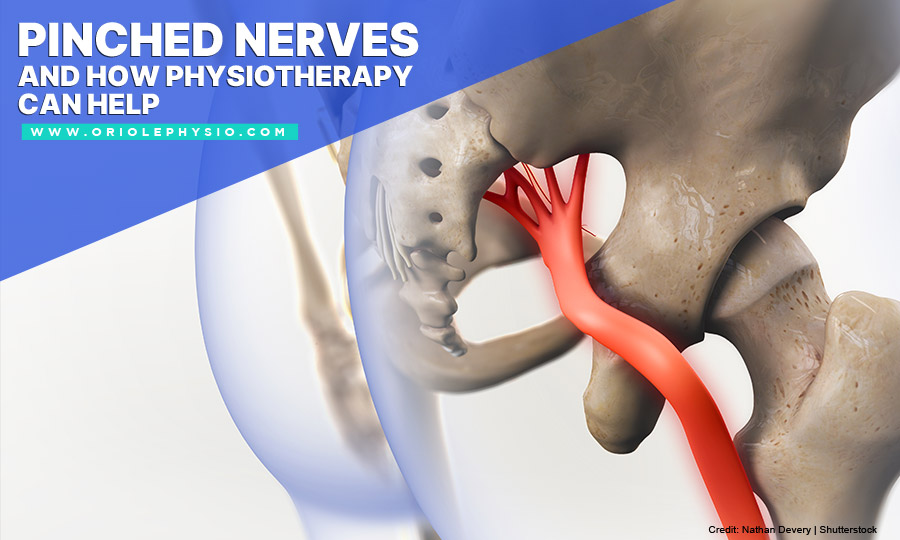Pinched Nerves and How Physiotherapy Can Help
Millions of nerves pass through your vertebral canal, navigating through your bones, muscles, and other tissues, to reach their final destination. If the nerves get too close to any of these structures, it results in compression, which causes pain. While healthcare professionals use various treatment methods to free and heal compressed nerves, the most common treatment is physiotherapy.
Before we get into how physiotherapy offers relief, let us first get to know the pinched nerve symptoms and risk factors:
Symptoms:
- Numbness or reduced sensation in the area where the nerve is compressed
- Sharp, aching, or burning painful feeling that radiates outward
- Paresthesia (tingling, pins and needles sensation)
- Weakness of the muscles in the affected area
- Constant feeling of hand or foot “fallen asleep.”
Risk Factors:

- Sex – Women are more at risk of developing carpal tunnel syndrome because their carpal tunnel is smaller.
- Bone spurs – Osteoarthritis and other types of health issues that causes bone spurs, a condition that stiffens the spine and narrows the neural foramen (opening between every 2 vertebrae where the nerve roots exit the spine), pinching the nerve.
- Rheumatoid arthritis – Rheumatoid arthritis causes inflammation that compresses the nerves in the joints.
- Thyroid disease – Thyroid disorders can increase your risk of carpal tunnel syndrome.
- Diabetes – Individuals diagnosed with diabetes tend to have a higher risk of nerve compression.
- Overuse – Engaging in activities that involve repetitive hand, wrist, or shoulder movements increase your likelihood of suffering a pinched nerve.
- Obesity. Excess body weight can jack up the pressure on nerves, resulting in compression.
- Pregnancy – Weight gain associated with pregnancy can contribute to the swelling of the nerve pathways, which leads to the compression of the nerves.
- Prolonged Rest – Prolonged periods of sitting or lying down can put you at a higher risk of nerve compression.
Diagnosing a Pinched Nerve
Before you get started with your physiotherapy for a pinched nerve, the therapist will perform a thorough evaluation of your current condition. This includes your medical history (when the symptoms started, affected areas, and factors that can worsen the symptoms). The physiotherapist will also conduct several tests to check for:
- Changes in reflexes
- Loss of sensation
- Weakness of the muscle
- Movements that alleviate or induce symptoms
The physiotherapist will refer you to a doctor if you require more testing. An MRI may be needed to check for any signs of soft tissue interference, such as bulging or herniated discs, or a CT scan to check for bone spurs.
How Physiotherapy Relieve a Pinched Nerve

The goal of physiotherapy treatment greatly depends on the severity of the injury. Upon immediate injury, the physiotherapist will perform a natural and conservative treatment approach that does not cause further irritation to the existing problem. Once the initial inflammation subsides, the therapist will carry out a stepwise approach to care to achieve the following goals:
- Boost strength
- Improve flexibility
- Correct body posture
- Minimize clinical symptoms, such as pain, numbness, and tingling
Several highly effective techniques help to relieve the symptoms of a pinched nerve. However, physiotherapy is a more natural treatment approach with fewer risks than other techniques. Take, for instance, medications. While they help alleviate pain and ease inflammation, they have unwanted side effects. Also, surgery may help release the compression, but it carries its own risks, and it is not ideal for all patients to undergo a surgical correction. However, physiotherapy is safe for patients of all ages and does not carry adverse side effects, such as overdose, dependence, or infection.
Over the years, physiotherapy has been the gold standard for pinched nerve treatment due to how it works to treat and prevent the problem in various ways. Let us look at the different ways that physiotherapy helps treat a compressed nerve.
- Muscle Strengthening
Performing physiotherapy exercises help treat a pinched nerve and aid in strengthening specific muscle groups. Muscles need to be strong enough to perform particular tasks or support other structures in your body. For instance, a person with weak spinal muscles tends to have poor posture. Poor body posture can add extra pressure on the spinal area, making you more prone to a pinched nerve in the lower back. Also, when the weak muscles cannot handle the pressure and stress placed on them properly, it forces other muscle structures to pick up the slack. This can lead to the shifting of the spinal discs, which can compress a nerve. - Posture Education
During your physiotherapy session, the therapist will also discuss potential problems with your body posture that may have contributed to the pinched nerve. Posture education helps patients who are suffering from compressed nerves correct posture imbalances. You will learn about the different tools and techniques to self-correct posture issues that strain specific nerves. - Range of Motion Exercises
The physiotherapist will guide you in performing certain physio exercises and stretches that will increase your range of motion to help you move freely without straining your spinal nerves. Range of motion exercise can also help relieve pain. - Traction Training
Traction is another physiotherapy technique that utilizes weights, pulleys, or harnesses to help target and stretch specific muscle groups. It effectively helps relieve painful symptoms of a pinched nerve by decompressing the body and removing the pressure from the affected area. - Physical Manipulation
Physiotherapists are trained to manipulate the body to target specific groups of muscle physically. Manipulation exercises are designed to ease muscle tension, potentially leading to inflammation, an underlying cause of a compressed nerve.
Physiotherapy treatment can be paired with other lifestyle changes, such as regular exercise and an improved diet, to yield better results. Our North York physiotherapy clinic offers a wide range of techniques to treat pinched nerves. Long-term pressure can result in permanent nerve damage. The earlier you receive treatment, the better
If you are looking for professional physiotherapy services in North York, call Oriole Physiotherapy & Rehabilitation Centre at (416) 221 0772 and find out how we can help you. Our team of licensed physiotherapists will be glad to answer any of your questions or concerns.



